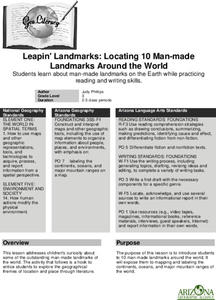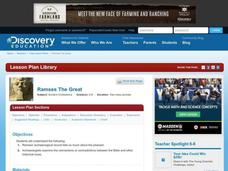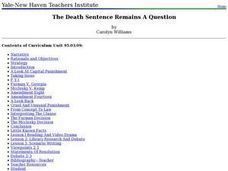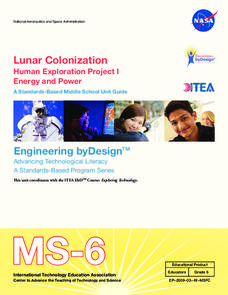Curated OER
America: The Land We Live In: Landmarks
Students explore the concept of landmarks. In this landmark instructional activity, students brainstorm different landmarks around their community and nationally. Students then identify the patterns in Georgia O'Keeffe's...
Learning Games Lab
Testing and Adjusting pH
Pupils learn how to control food spoilage by adjusting the food's pH. They see that one of the most dangerous bacteria can grow in food if people don't handle and store food properly. Using knowledge of the bacteria's preferred pH,...
Baylor College
Energy for Life (Energy from Food)
Energy comes in many forms, but how do living things get the energy they need to survive and thrive? In a simple, controlled experiment with yeast, water, and sugar, groups make observations about how yeast reacts with water alone, then...
Chicago Botanic Garden
Faces of Climate Change
How does climate change affect you? First in a three-part series, the activity focuses on how individuals living around the world are affected by climate change. Individuals take on the role of a given character and share their...
NPR
The Obama Years
Beginning with a quick writing prompt, young historians write about what they will remember most about President Obama's legacy. The activity opens up a larger discussion and exploration of his accomplishments, milestones, and...
Curated OER
Leapin' Landmarks: Locating 10 man-made landmarks around the world
Third graders engage in a instructional activity which addresses their curiosity about some of the outstanding people-made landmarks of the world. They explore the geographical themes of location and place through literature.
Curated OER
Ramses The Great
Students investigate the statue that memorialized Ramses II. In this world monuments lesson plan, students research national and local monuments to find out if there are any controversies regarding their construction....
Curated OER
The Holy Land
Explore the culture, geography, and religion of Ethiopia. Learners complete a viewing guide while watching a film on Ethiopia as the first Christian country in Africa. Additionally, they create group presentations and write paragraphs...
DK Publishing
Cubes of Small Numbers
Now that geometers know how to solve for square units, can they solve for cubed units? Explore this concept as scholars examine four cubes to solve for volume in each. A detailed example explains this process, but you may consider asking...
GCSE Modern World History
Mao's China
Here is a great textbook chapter on China's establishment as a communist state in 1949 and the effects of World War II on the nation. The first page prompts learners to complete a timeline activity as they read the material,...
US Institute of Peace
Organizations Working for Peace
We're all in this together! Show young scholars that peace is a process and having the support of like-minded people can make it happen. 13th in a series of 15 peace building activities, groups conduct research on a peace organization,...
Curated OER
The Death Sentence Remains A Question
Examine the results of recent opinion polls on where people stand on the issue of the death penalty. In groups, middle schoolers examine various cases dealing with this issue and discuss the judgments. They write their own argument for...
Curated OER
Peace Corps Challenge Game- Food from Other Countries
Students examine traditional foods from other cultures. In this Peace Corps Challenge game, students research food preferences and delicacies in other countries and compare to the traditional American cuisine. Students...
Curated OER
Create Your Own Country Project
Young scholars demonstrate their knowledge of geography with this fun, collaborative social studies project. Working in small groups, students develop their very own countries, writing descriptions...
University of Arkansas
Human Rights
What basic rights are guaranteed to all Americans? Do citizens, legal aliens, illegal aliens, and minors all have the same rights? Should individuals all over the world enjoy the same rights? Class members read the Declaration of...
Curated OER
Cartoons for the Classroom: Satire or Slander
Encourage your young learners to analyze and think critically about how media portrays people or events. Upper graders analyze a political cartoon depicting President Obama as a Muslim and the First Lady as a revolutionary. Guided by...
Curated OER
Acting for the Common Goods
The first of a three-part series on bullying, this plan has class members present skits about bullying, write and sign an anti-bullying pledge, and complete a service project. For the skit, learners use information from previous lessons...
Hyperion Publishing
Words We Live By: Your Annotated Guide to the Constitution
The language of the Constitution can feel quite ominous to young learners, but there are a variety of strategies you can utilize to help your class grasp the important concepts and ideals in our nation's founding document. This lesson...
PBS
Constitution Day
Travel back to 1787 as young scholars investigate the creation of the US Constitution. After first working in small groups to create sets of classroom rules, learners go on to read a summary of the Constitution and watch a short video...
NASA
Lunar Colonization
A five-lesson unit challenges teams to design a complex to allow people to colonize the Moon. The teams first work in order to understand the challenge before becoming experts. Expert teams learn about different aspects needed to survive...
Nemours KidsHealth
Food Labels: Grades 3-5
Bring awareness to the ingredients scholars ingest daily with two lessons that look deeply into food labels. The first lesson explores the difference between processed and fresh foods while the second lesson focuses on sugar content.
Curated OER
An Exploration of Cradle-to-Cradle Design Thinking
Introduce cradle-to-cradle design thinking. Scholars first discuss the importance of natural laws and rights. They then use a variety of online and print resources to research eco-efficiency and cradle-to-cradle design.
Chicago Botanic Garden
Calculating Your Carbon Footprint
Unplugging from technology for one day per week will decrease your carbon footprint—are you up to the challenge? Part two in a series of three allows individuals to explore their personal carbon footprints. By first taking a quiz at home...
California Academy of Science
The Heat is On: Cause and Effect and Climate
The higher the number of letters in the final word for the National Spelling Bee, the higher the number of people killed by venomous spiders. Obviously, those two facts correlate, but no causation exists. Scholars view data based on...























